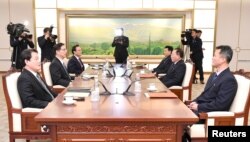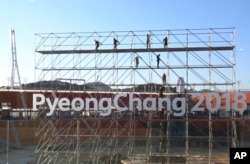North Korea’s conciliatory message sent out Thursday may indicate South Korea’s Olympic outreach is working, but there are concerns that improving inter-Korean relations could undermine the U.S. maximum pressure strategy.
Following a joint meeting of the country’s political parties, the Kim Jong Un government issued a statement that urged all Koreans “at home and abroad” to “rapidly improve the north-south relations” and work toward a “breakthrough for independent reunification.” The message also endorsed defusing military tensions on the Korean Peninsula and promoting increased cooperation and exchange programs.
The peaceful overture from Pyongyang is the latest positive development to come out of South Korean President Moon Jae-in’s efforts to persuade North Korea to participate in the Olympics as a way to restart inter-Korean dialogue and reduce tensions.
The Kim Jong Un government’s agreement to send a large delegation to South Korea for the Pyeongchang 2018 Olympics Winter Games has achieved a temporary pause in North Korea’s ongoing efforts to develop a long-range nuclear missile capable of reaching the U.S. mainland. Moon also was able to get the U.S. to delay annual joint military exercises with South Korea, which the North views as provocative rehearsals for invasion.
Peace offensive
North Korea’s sudden accommodating attitude has left many analysts skeptical.
“I would like somehow the Olympic experience to transform North Korean behavior and that they become a more cooperative state, (but) I don’t think that’s going to be the case,” said security analyst Daniel Pinkston, who is a lecturer in international relations with Troy University in Seoul.
The Moon administration’s goal is to persuade Pyongyang to return to international talks to dismantle its nuclear weapons in exchange for sanctions relief and security guarantees.
But North Korea has taken an uncompromising position in declaring itself a nuclear state, justifying its need for nuclear weapons to defend against a U.S. invasion and refusing to discuss the prospect of denuclearization.
The U.S. is skeptical of Pyongyang’s claim that its nuclear weapons are for self-defense only. CIA Director Mike Pompeo this week said North Korea is prepared to use its nuclear capability for “coercive” purposes to ultimately reunify the Korean Peninsula under Kim’s rule.
Washington also views the North’s long-range nuclear missile development as an existential threat and has demanded Pyongyang agree to give up its nuclear weapons before any formal talks can proceed.
Negotiation window
This Olympic truce may open a window of opportunity to seek a peaceful resolution to the nuclear standoff. There is speculation that if inter-Korean cooperation continues, President Moon will seek to cancel this years’ joint drills in the spring to provide even more diplomatic space.
It is not clear if Washington would agree to further postponing joint exercises that it says are needed for military deterrence readiness. And there is some concern in the U.S. that President Moon may waver in his support for the U.S. “maximum pressure” policy to impose crippling sanctions on North Korea, and instead agree to ease economic pressure for further inter-Korean cooperation.
“If they decide to go to the other path and give into some of North Korea’s demands, I think that will create a definite fissure between us and the Moon administration,” said former CIA analyst Sue Mi Terry, at a Center for Strategic and International Studies (CSIS) security forum in Washington on Wednesday.
South Korean opposition groups have also criticized Moon for accommodating the North’s Olympic participation, which they say is part of a propaganda good will campaign to seek sanctions relief.
However, Terry, a senior fellow with CSIS, said she did not believe the Moon administration would undermine its U.S. alliance by renewing economic cooperation with Pyongyang at this time.
“They told us that they learned from history in dealing with North Korea, that they are not going to make unilateral concessions to the North Koreans,” Terry said.
Noting that North Korea’s Olympics cooperation is a “good thing,” South Korean Foreign Minister Kang Kyung-wha said Thursday her government is prepared for further provocations as well, during an interview with Reuters on the sidelines of the World Economic Forum in Davos, Switzerland.
While calling for improved relations with the South, Pyongyang is also preparing for a massive military parade likely to be held Feb. 8, the day before the Olympics opening ceremony, which the government recently announced as a holiday to honor the founding of the country’s armed forces.
In Seoul, Youmi Kim contributed to this report.


